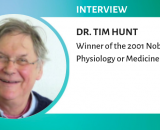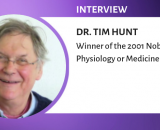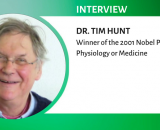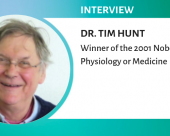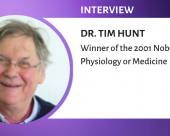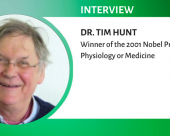Everybody faces manuscript rejection, even a Nobel Laureate
Interview with Dr. Tim Hunt
It is not every day that you get to chat with a Nobel Laureate, so when you do, it’s bound to be special! Catch this interesting interview series with Dr. Tim Hunt conducted by Clarinda Cerejo, Editor-in-Chief, Editage Insights. Through cheerful anecdotes, a characteristically witty humor, and friendly advice, Dr. Hunt narrates his experiences around winning the Nobel Prize and describes how the event changed his life. He also provides some valuable advice for aspiring researchers by sharing some of his experiences as a scientist.

Dr. Tim Hunt is renowned for his work on cell cycle regulation for which he won the 2001 Nobel Prize in Physiology or Medicine along with Dr. Lee Hartwell and Dr. Paul Nurse. Dr. Hunt discovered cyclins, proteins that are crucial for mitosis and other cell cycle transitions. Before this, the focus of his research was on the control of haemoglobin synthesis in red blood cells. After a long and successful academic career that culminated with him as a principal scientist at the Imperial Cancer Research Fund (now Cancer Research UK), Dr. Hunt is currently retired.
In the first segment of our interview, I asked Dr. Hunt to share his experience winning the Nobel Prize and in the second segment, he told us more about how he developed an interest in biology. In this concluding segment, Dr. Hunt and I discuss larger issues related to research - how researchers should aim for the Nobel Prize, what skills they should develop, how they should follow their instinct, learn to adapt, and so on. Dr. Hunt also says that perseverance, hard work, grit, ambition, and patience are the qualities that will help you build a successful research career. This concluding interview segment is full of nuggets of wisdom from Dr. Hunt.
Let’s talk about research in general. Do you think conducting research is easier today, owing to technological advancements? Or, is it just more competitive? Maybe, you could talk about some of the challenges you’ve faced over your career.
To be frank, when I started out, the tools available to us were crude. I can think of many examples here. Our department did not have a photocopier because the machines were far too expensive and only big corporations could afford them. Now, they are much more affordable. We only had a mechanical calculator, which took a long time to perform calculations. We used the university mainframe computer to work out the results of simultaneous equations. You had to type out both program and data on punched tape, which you couldn’t really proofread. So mistakes were common and the program would just display, for example, “error on line 17” because you made a silly typing error. You hung up your little tapes in a little plastic bag on a hook in the computing lab and came back the following morning to see whether it had run, and often it hadn’t run because there was a typo. Today, you and I are having real-time conversation despite being thousands of miles apart. This ease of communication was not possible in my time. A lot has changed. The same holds true for research: you see developments you couldn’t conceive of in those days.
Now, I think the problem is that everybody has access to the same techniques and it’s quite hard to stay ahead of the game, unless you can invent a new technique altogether. The research scene today is highly competitive. There are probably more scientists working in my own field than ever before. I often joke to younger researchers about how glad I am that I am not 20-something years old anymore, because I sense that it’s tough out there. The tools are very advanced and problems that you thought would never ever be attacked have been attacked. I never thought we would know as much in my lifetime as we know today, particularly about areas like developmental biology. It’s fantastic, but it’s also really hard.
Publication is also an important part of every researcher’s career. What kind of challenges did you face? Was your manuscript ever rejected?
Of course, I’ve had my manuscripts rejected! It’s very rare, almost unknown to get a letter from the editor saying, “We love your paper! We’ll publish it without any changes.” The most amusing letter I received from a journal was about the work that eventually got me the Nobel Prize. The editor said something to the effect that the journal would publish my paper, but “in nothing like its present form”. I had to rewrite it completely and without any new data: the editor found the first version to be way over the top and euphoric. To tell the truth, I knew that I’d made an important discovery, but I failed to explain it effectively. One of my weaknesses is that I’ve never been very good at writing essays or reviews.
But dealing with rejection wasn’t that difficult. I admit that when we started out, it was a bit easier to get published because things weren’t so competitive. There weren’t so many researchers from the same field. We weren’t particularly well known in our field. But I never had a paper rejected that I thought should have been published. Quite often, my papers did need a lot of revision or did not meet with a positive initial reception. It’s quite dynamic—sometimes you get through smoothly and sometimes papers that you are not particularly proud of are accepted very easily. I think you win some and lose some.
Throughout my career, I learned that when you discover something important, it usually meets with some resistance. I think this is partly because people don’t like new ideas and partly because they are slightly jealous that they did not make that discovery in the first place. Such competition certainly exists among researchers, even senior ones. It’s human nature.
But rejection is part of the process. I am currently in talks with a colleague about revising his paper, which is still under review and revision a whole year after it was first submitted. I feel that in the case of this paper, the reviewers are asking for irrelevant changes and are failing to grasp the focus of the paper. For me, as an author, it’s about the larger perspective rather than the finer details. As a reviewer, I did care about the fine details if it was clear that the authors had made a mistake or that those details were absolutely relevant to the paper. But if a paper is interesting and is making an important contribution, I would say that reviewers should stop nit-picking. If the authors have made mistakes along the way, they will be corrected soon enough. I am not saying that we should publish bad or incorrect science. But we should also not delay the publication of promising discoveries because of a compulsive need to improve someone else’s work to impossibly high standards.
Then did winning the Nobel Prize improve your acceptance rate with journals?
I don’t think it made any difference. If anything, journal editors and reviewers possibly became stricter. Incidentally, my last paper, of which I am rather proud actually, was published in Science, but was rejected without a review by Nature. I am not too surprised about this, because things are so specialized these days. So it doesn’t matter who you are. If your work is good, your paper will be accepted, but if it is rejected, you should try again. There are genuine matters of taste as well in this business.
Sometimes, I think, scientists start believing that anything they say is brilliant. That is why they find it difficult to deal with journal rejection. I think that the publication system reputable journals adopt is quite fair. If your paper is rejected, it could be because either the data are not sufficient or you haven’t communicated clearly. Mostly, it’s the latter and I can tell this from being a reviewer myself. Sometimes, you can’t make head or tail of an introductory paragraph and wish that the author had spent some time explaining his or her work better.
So Dr. Hunt, what would you say are the essential skills a researcher needs to have to stay ahead of this competitive game?
I don’t think there is any sort of simple answer to that. Growing up in Cambridge, I knew a lot of Nobel Laureates and I think the one thing that was most striking was their heterogeneity—some of them were very clever, some not so clever; some were modest, some were arrogant. They worked on a wide variety of things in a wide variety of ways. The only common thing was that there was a certain simplicity about them when you took a deeper look at their personalities. It’s fine to work on really complicated brainy problems, but you should be able to understand it thoroughly and boil it down to something really simple. When I started out, I rather think we were trying to be far too clever and sophisticated, whereas all we needed to do was to keep things simple. I see this tendency in many young researchers: they learn too much and make things very grandiose. They don’t concentrate on the essentials. They don’t get back to basics. I think it is crucial to go back to the basics and keep things simple. On the whole, it is important to remember that although there are many ways to succeed, there are even more ways to fail.
What about work life balance? Do you think it is possible for researchers to have a life after work or outside the lab?
Well, I confess that when I was engrossed in research, I did not have a family and spent long hours in the lab. I did spend a lot of time away from home. In my case, I did my most important work during my summer assignments. I would go away for 2 or 3 months every summer and teach. I don’t think I could have done this if I’d had a family to look after. My work occupied almost all my time and I rarely took holidays or even weekends off. But it was also fun, surrounded by lots of people, young and old.
You do have to travel to attend meetings, sometimes in very nice places, because that is an important part of being a scientist. But during my career, sitting on the beach doing nothing would have seemed like an awful waste of time to me. I do admire people who can organize their time and be super-efficient. So there are both types of researchers – those who can manage their time and those who can’t. But in either case, it’s tough. When you are really on the track of something as a researcher, it becomes an obsession and it’s difficult to know when to stop.
You've already given us some gems of advice for researchers. But let's come back to the Nobel Prize. In a video lecture, you remarked that if you (Tim Hunt) can win the Nobel Prize, anybody can. That’s a really powerful statement because winning the Nobel is probably the biggest dream of any researcher. So what would you say one has to do to win it? Give us the secret recipe!
Haha! Well, I think you certainly have to be lucky, and in my experience, intelligent scientists who also work hard seem to get luckier. My piece of advice to researchers aspiring to make it big: Keep your feet on the ground, your eyes on the horizon, and your nose to the grindstone. It is a matter of not getting lazy and being on the lookout for clues. I think the one thing I have been quite good at is realizing the significance of little clues when they come along. If there’s something, an idea or a hunch, at the back of your mind but you haven’t been able to figure out how to solve the problem, keep at it - follow your instinct instead of waiting for the problem to solve itself. I don’t think I have ever known a problem yield to direct attack actually. So find other ways to get answers.
While pursuing a research question, you will realize that there are problems you can attack directly and there are those you can’t because you don’t know enough about them. So you have to try different ways to find a solution; and this is where luck plays a part. I do think that success also depends on being in the right place at the right time.
Mere luck and hard work are not enough. Ambition is important, too. During a recent interview with Miranda Robertson, I said that, quite often, Nobel Prizes are given for things that people thought were impossible to achieve. For example, when I was still in college, people said that DNA sequencing was impossible. But Fred Sanger proved everybody wrong. Another example is that of the ribosome. We were taught that the structure of the ribosome could never be fully revealed because it was too complex and ribosomes would never crystalize. Even if they did crystalize, there would be too much data to decipher. It was a formidable problem, but people did tackle it. Now we know what the ribosome looks like and you can pretty much see how they work! So a certain degree of ambition is necessary. It is okay to attempt the impossible, but wait until you see a crack, a way in.
Thank you for the great conversation, Dr. Hunt!
Read the first two segments of our interview with Dr. Tim Hunt:
Published on: Oct 03, 2015
Comments
You're looking to give wings to your academic career and publication journey. We like that!
Why don't we give you complete access! Create a free account and get unlimited access to all resources & a vibrant researcher community.




